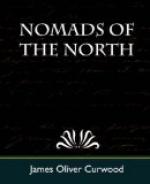He made in the direction of the cabin, but every foot that he dragged himself was filled with agony, and his progress was so slow that at the end of an hour he had not gone more than a quarter of a mile. Another night found him less than two miles from the deadfall. He pulled himself under a shelter of brush and lay there until dawn. All through that day he did not move. The next, which was the fourth since he had left the cabin to hunt, the pain in his back was not so great. But he could pull himself through the snow only a few yards at a time. Again the good spirit of the forests favoured him for in the afternoon he came upon the partly eaten carcass of a buck killed by the wolves. The flesh was frozen but he gnawed at it ravenously. Then he found himself a shelter under a mass of fallen tree-tops, and for ten days thereafter he lay between life and death. He would have died had it not been for the buck. To the carcass he managed to drag himself, sometimes each day and sometimes every other day, and kept himself from starving. It was the end of the second week before he could stand well on his feet. The fifteenth day he returned to the cabin.
In the edge of the clearing there fell upon him slowly a foreboding of great change. The cabin was there. It was no different than it had been fifteen days ago. But out of the chimney there came no smoke, and the windows were white with frost. About it the snow lay clean and white, like an unspotted sheet. He made his way hesitatingly across the clearing to the door. There were no tracks. Drifted snow was piled high over the sill. He whined, and scratched at the door. There was no answer. And he heard no sound.
He went back into the edge of the timber, and waited. He waited all through that day, going occasionally to the cabin, and smelling about it, to convince himself that he had not made a mistake. When darkness came he hollowed himself out a bed in the fresh snow close to the door and lay there all through the night. Day came again, gray and empty and still there was no smoke from the chimney or sound from within the log walls, and at last he knew that Challoner and Nanette and the baby were gone. But he was hopeful. He no longer listened for sound from within the cabin, but watched and listened for them to come from out of the forest. He made short quests, hunting now on this side and now on that of the cabin, sniffing futilely at the fresh and trackless snow and pointing the wind for minutes at a time. In the afternoon, with a forlorn slouch to his body, he went deeper into the forest to hunt for a rabbit. When he had killed and eaten his supper he returned again and slept a second night in the burrow beside the door. A third day and a third night he remained, and the third night he heard the wolves howling under a clear and star-filled sky, and from him there came his first cry—a yearning, grief-filled cry that rose wailingly out of the clearing; the entreaty for his master, for Nanette, and the baby. It was not an answer to the wolves. In its note there was a trembling fear, the voicing of a thing that had grown into hopelessness.




